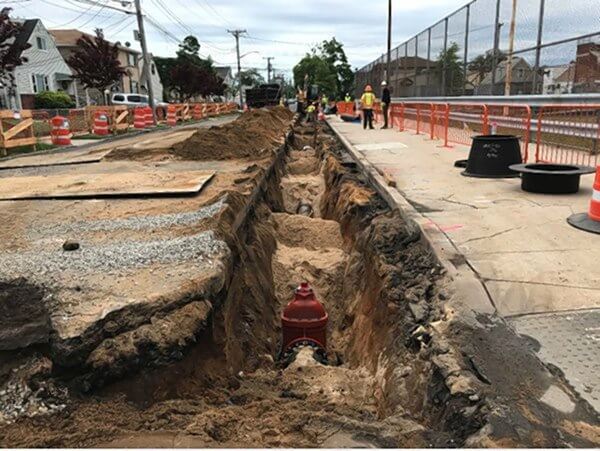By Naeisha Rose
The Southeast Queens Sewer Project, a $1.9 billion effort to reduce flooding and upgrade sewers and water mains while installing catch basins, is underway in Rochdale and community leaders are delighted by the long-awaited infrastructure improvements.
“Throughout southeast Queens there has been a flooding problem, a sewer problem – and finally with this City Council it is being addressed,” said Clifton Diaz, a board member of the Rochdale Village Civic Association. “Councilwoman Adrienne Adams (D-Jamaica) has been in the forefront, along with Councilman Richard Donovan (D-Far Rockaway) to address the problem.”
Diaz, 69, has been a resident of Queens since 1961 and a resident of Rochdale Village since 1964 and has noticed flooding and sewer problems in the southeast Queens area since his move to the borough from the Bronx.
“This project is an example of the quality-of-life improvements that our community needs,” said Adams. “It will also help to alleviate flooding and improve roadway drainage.”
The Rochdale project received $62 million for repair, upgrades and new installations from the city’s Department of Environmental Protection and is one of 45 projects being tackled in southeast Queens, according to DEP Commissioner Vincent Sapienza. Contractors received the go-ahead to start working in March, a team was mobilized by May, and the official public announcement for the project was made June 7.
The Department of Design and Construction is managing the development, which starts at 122nd Avenue and Guy R. Boulevard and stretches from 136th Avenue and North Conduit Avenue to 161st Street and 140th Avenue, according to a map of the project.
To improve the area 44 new catch basins will be installed, 87 existing ones will be replaced, up to 11,000 feet of old sanitary sewers will be replaced with larger ones, 1,550 feet of new storm sewers will be installed and 6,600 feet of additional ones will be replaced with larger pipes, according to the DEP and the DDC.
“That vicinity suffers from ponding and poor street conditions as a result of the area generally being very flat, very low-lined, having very low elevation – and so when the streets were constructed a lot of them have apparently not held up well,” said Ian Michaels, a spokesman for the DDC. “You can go there days after a rainstorm and find puddles, or a large ponding situation, as we call them.”
Field surveyors estimated that the current water mains have been there since the 1920s, according to Michaels. The 18,000 feet of old cast iron water mains will be replaced by better material.
“Since 1970, all the water mains that get replaced in New York City get replaced with ductile iron, which are concrete-lined,” said Michaels. “Cast iron was a good material when they used it, but it is very brittle and are more likely to break. The new pipes are more pliable…and they are less susceptible to breakage under stress.”
The new and upgraded storm sewers will have pipes as large as 66 inches in diameter, and the sanitary sewers will be as large as 36 inches in diameter, according to the DDC. Older storm pipes were eight to 12 inches in diameter and most of the sanitary pipes were eight to 15 inches in diameter. The roads above the pipes and fire hydrants will also be upgraded.
“As long as we are digging up these streets and putting in new pipes, we want to put in adequately sized pipes. It doesn’t make sense to replace them with the same size in every location.” said Michaels, and “when you do street reconstruction up top to improve storm water drainage, you also want to do the infrastructure underneath, too, because you don’t want to pave the street and rebuild the street and want to come back a year later to replace something underneath the street and dig it up again.”
“This is all beneficial to the citizens of the city of New York,” said Diaz. “Me personally, I appreciate this.”
Reach reporter Naeisha Rose by e-mail at nrose



































